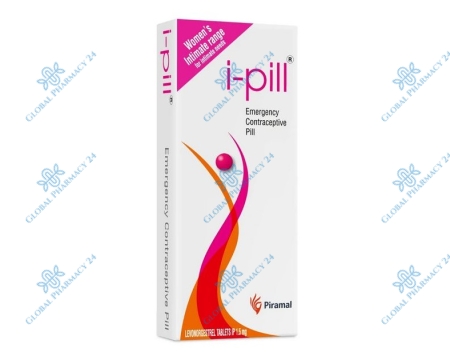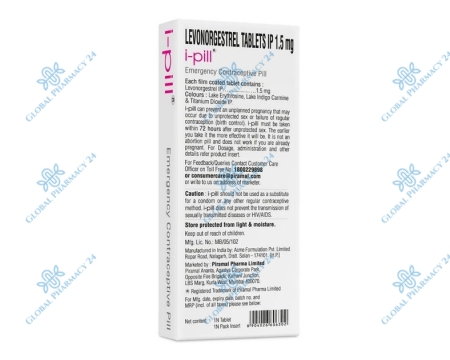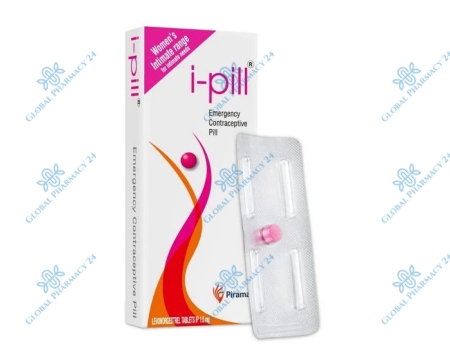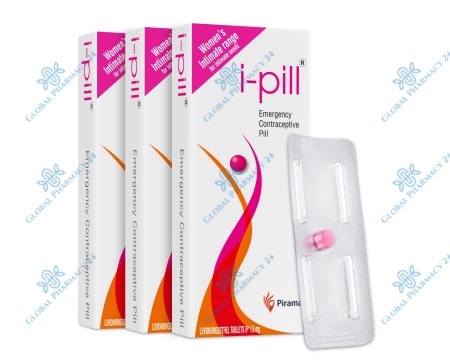| Characteristic | Detail |
|---|---|
| Active Ingredient | Levonorgestrel |
| Dosage Form | Oral Tablet |
| Strength | 1.5 mg |
| Duration of Action | Up to 72 hours after unprotected sex |
| Effectiveness | Approximately 89% when taken within the first 24 hours |
| Manufacturer | Piramal Healthcare |
An Introduction to the i-pill
The i-pill represents a significant advancement in emergency contraception, offering a reliable and accessible option for preventing pregnancy after unprotected intercourse. As a form of emergency contraceptive pill (ECP), it contains the hormone levonorgestrel, which is effective in delaying ovulation and preventing fertilization. The i-pill has become a cornerstone of modern reproductive health, empowering individuals with the choice and control over their reproductive decisions.
Designed for use within 72 hours of unprotected sex or contraceptive failure, the i-pill has garnered recognition for its convenience and efficacy. It has revolutionized the approach to emergency contraception, making it a widely accepted solution across various demographics. The global acceptance and trust in the i-pill underscore its role in enhancing sexual and reproductive health and rights, marking it as a pivotal tool in family planning resources.
Overview: What is the i-pill?
The i-pill is an emergency contraceptive pill containing the active ingredient levonorgestrel, intended to prevent pregnancy after unprotected sexual intercourse or contraceptive failure. It is a one-dose regimen that works best when taken as soon as possible within the 72-hour window following unprotected sex.
The Origin and Manufacturer of the i-pill
Piramal Healthcare, a leading pharmaceutical company, manufactures the i-pill. Its development was driven by the need for effective, immediate contraception options, positioning the i-pill as a key player in global reproductive health initiatives.
The global impact and acceptance of the i-pill
The i-pill has significantly impacted global health by providing a reliable emergency contraception method, reducing the incidence of unintended pregnancies worldwide and contributing to the empowerment of individuals in managing their reproductive health.
The Mechanism and Efficacy of the i-pill
The i-pill operates by releasing levonorgestrel, a synthetic hormone that prevents pregnancy primarily by inhibiting ovulation. It may also prevent fertilization of an egg (if ovulation has already occurred) or prevent a fertilized egg from attaching to the womb. The effectiveness of the i-pill in preventing pregnancy is highest when taken immediately after unprotected intercourse and decreases gradually over 72 hours.
Studies have demonstrated the i-pill's high efficacy rate, making it a critical component of emergency contraception strategies. Its role in preventing unintended pregnancies, especially when used as directed within the optimal time frame, highlights its importance in sexual health and family planning efforts.
How does the i-pill work?
By temporarily stopping the release of an egg from the ovary, the i-pill effectively prevents ovulation. Additionally, it may alter the lining of the uterus to prevent a fertilized egg from implanting, thus preventing pregnancy.
The effectiveness of the i-pill in preventing pregnancy
The i-pill is approximately 89% effective when taken within 24 hours of unprotected sex, with its efficacy decreasing to 58% if taken between 48 to 72 hours. Its timely administration is crucial for maximum effectiveness.
Comparing the i-pill with other emergency contraceptives
Emergency contraceptives vary in terms of composition, timing of effectiveness, and method of action. The i-pill, with its active ingredient levonorgestrel, is among the most commonly used due to its efficacy and accessibility.
Summary Table: i-pill vs Other Emergency Contraceptives
| Contraceptive | Active Ingredient | Effectiveness | Time Frame |
|---|---|---|---|
| i-pill | Levonorgestrel | 89% within 24 hours | Up to 72 hours |
| Plan B One-Step | Levonorgestrel | 89% within 24 hours | Up to 72 hours |
| Ella | Ulipristal acetate | Up to 85% within 120 hours | Up to 120 hours |
Using the i-pill Correctly: Dosage and Timing
The i-pill is most effective when taken as soon as possible after unprotected sex, ideally within 24 hours but no later than 72 hours. It is a single-dose pill, which simplifies its use and accessibility. Understanding the correct timing and dosage is crucial for maximizing its effectiveness and minimizing the risk of unintended pregnancy.
Despite its effectiveness, the i-pill should not be used as a regular method of contraception. It is designed for emergency use only and does not protect against sexually transmitted infections. Its role is to provide a safe, effective solution in cases of contraceptive failure or absence of contraception during intercourse.
When and How to Take the i-pill
The i-pill should be taken orally, with or without food, as soon as possible within 72 hours after unprotected sex. Delaying the intake reduces its effectiveness in preventing pregnancy.
The Influence of Food and Alcohol on i-pill effectiveness
While food does not significantly affect the i-pill's efficacy, heavy alcohol consumption may impact its absorption. It's advisable to limit alcohol intake when using the i-pill to ensure optimal effectiveness.
Common and Uncommon Side Effects
Common side effects include nausea, fatigue, headache, dizziness, breast tenderness, and changes in menstrual cycle. Uncommon side effects, though rare, can include severe abdominal pain, heavy or prolonged bleeding, and allergic reactions.
When to Seek Medical Attention: Extreme side effects
If experiencing severe abdominal pain, significant changes in bleeding patterns, or signs of an allergic reaction, it is crucial to seek immediate medical attention. These symptoms could indicate a more serious condition, such as an ectopic pregnancy or a severe adverse reaction to the medication.
Contraindications and Precautions with the i-pill
While the i-pill is accessible and effective for many, it is not suitable for everyone. Certain medical conditions and situations may contraindicate its use, highlighting the importance of understanding these restrictions to prevent potential health risks. Consulting with a healthcare provider before using the i-pill can ensure its safe and appropriate use.
Recognizing the interactions between the i-pill and other medications is also critical for preventing diminished efficacy or increased risk of side effects. This knowledge empowers users to make informed decisions about their emergency contraceptive options, with a focus on safety and efficacy.
People who should avoid using the i-pill
Individuals with known allergies to levonorgestrel or any component of the i-pill, those with severe liver disease, or those who suspect they may already be pregnant should avoid using the i-pill. Additionally, it may be less effective in women over a certain body weight threshold.
Interactions with Other Medications
Certain medications and herbal supplements, such as barbiturates, some HIV medications, and St. John's Wort, can reduce the effectiveness of the i-pill. Discussing all current medications with a healthcare provider before taking the i-pill can help manage these interactions.
Pros and Cons of the i-pill
- Pros:
- Highly effective when taken within 24 hours of unprotected sex
- Accessible without a prescription
- Single-dose convenience
- Can be used as a backup method for contraceptive failure
- Cons:
- Potential side effects, such as nausea and changes in menstrual cycle
- Decreased effectiveness over time after intercourse
- Not intended as a regular method of contraception
- May interact with other medications
In conclusion, the i-pill offers a critical option for emergency contraception, providing a safety net for those facing the risk of unintended pregnancy. By understanding how to use the i-pill correctly, its potential side effects, and when it may not be the most suitable option, individuals can make informed decisions about their reproductive health. It's essential to consider both the benefits and limitations of the i-pill, consulting with healthcare providers to ensure its use is safe and effective based on individual health needs and circumstances.
FAQs i-pill
1. What is i-pill?
i-pill is an emergency contraceptive pill that is used to prevent pregnancy after unprotected sex or contraceptive failure.
2. How does i-pill work?
i-pill works primarily by preventing or delaying ovulation, which means it stops the release of an egg from the ovary. It may also prevent fertilization of the egg or implantation of a fertilized egg in the uterus.
3. When should I take i-pill?
i-pill is most effective when taken as soon as possible after unprotected sex or contraceptive failure. It is recommended to take it within 72 hours (3 days) of intercourse, but the sooner it is taken, the more effective it is.
4. Is i-pill 100% effective?
No contraceptive method is 100% effective. i-pill significantly reduces the risk of pregnancy, but there is still a chance of pregnancy even after taking it, especially if it is not taken correctly or within the recommended timeframe.
5. What are the possible side effects of i-pill?
Common side effects of i-pill may include nausea, vomiting, abdominal pain, fatigue, headache, and changes in menstrual bleeding. These side effects usually go away on their own and are not serious.
6. Can I use i-pill as a regular form of contraception?
No, i-pill is not intended to be used as a regular form of contraception. It is meant to be used in emergency situations only and should not replace regular methods of contraception such as condoms or birth control pills.
7. Is i-pill safe?
i-pill is generally safe when used as directed. However, like any medication, it may not be suitable for everyone. It is important to read the instructions carefully and consult with a healthcare professional if you have any concerns or underlying health conditions.























